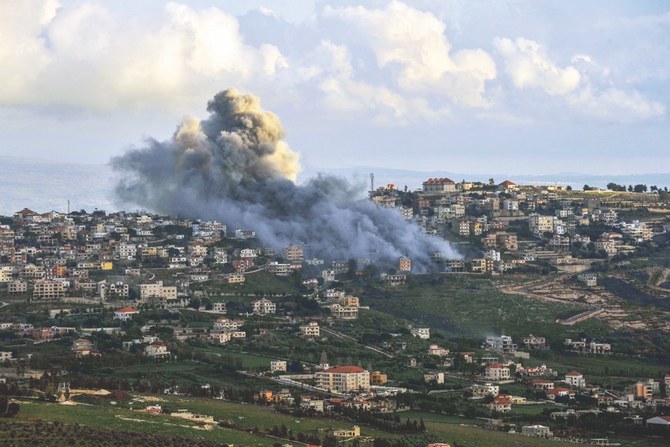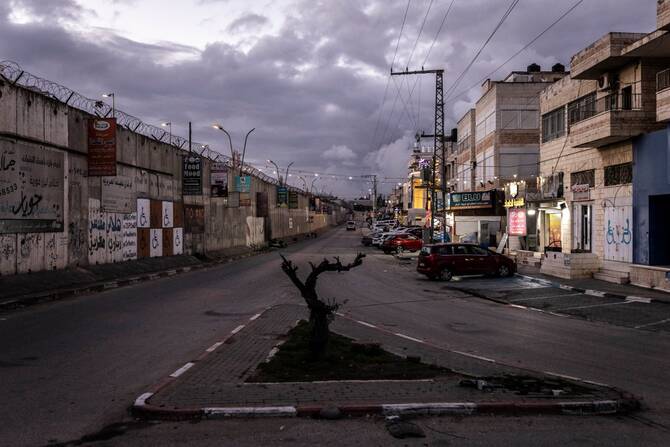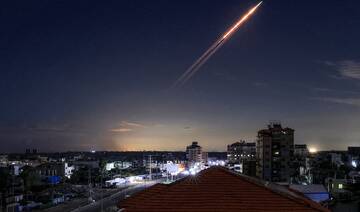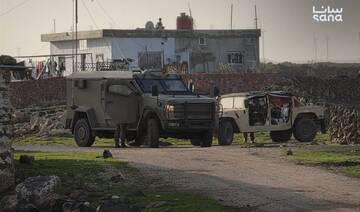BEIRUT: For more than six months, an undeclared war has been raging along Lebanon’s southern border with Israel, leading to the displacement of some 92,000 Lebanese citizens and the destruction of homes, businesses and agriculture.
The front line of this conflict between Hezbollah and the Israeli armed forces stretches some 850 km, incorporating parts of the UN-monitored Blue Line, with missiles fired by both sides reaching up to 15 km into their respective territories.
Although the exchanges have remained relatively contained, Israeli attacks have caused civilian deaths, damaged and destroyed homes, infrastructure and farmland, and ignited forest fires. Civilians on both sides of the border have been displaced.
“Our town is right on the border, and there are now only 100 out of 1,000 residents, and the rest are those who are unable to secure an alternative livelihood,” Jean Ghafri, mayor of Alma Al-Shaab, a predominantly Christian village in the Tyre District, told Arab News.
“So far, the shelling has destroyed 94 houses, and 60 percent of the olive groves, mango, and avocado orchards, vineyards, olive and carob trees have been burned, and some of the olive trees that were burned are 300 years old.”
Most of the people in the border region are Shiite. The rest are Sunni, Druze and Christians, along with dozens of Syrian refugee families, some 10,000 troops of UNIFIL, or UN Interim Force in Lebanon, and a few thousand Lebanese soldiers.
Members of Lebanon’s Iran-backed Hezbollah militia began launching rocket attacks against Israel on Oct. 8, a day after the Hamas-led assault on southern Israel triggered the war in Gaza.

A bulldozer removes rubble after an Israeli strike on a house in the southern Lebanese village of Sultaniyeh. (AFP/File)
Since then, Hezbollah and the Israeli military have traded fire along the shared border, raising fears that the Gaza conflict could spill over and engulf Lebanon in a devastating war reminiscent of the 2006 Israeli invasion.
“The town, although it is in a conflict zone, did not witness this level of direct destruction in the 2006 war,” said Ghafri. “It is impossible to know the exact damage because the area is considered a war zone. Those who are still there are receiving food rations from religious or international organizations.”
Al-Dahira is another town that has come under heavy shelling on an almost daily basis since the conflict began. It was from its nearby border that Hezbollah began its military assault on Oct. 8.
Its mayor, Abdullah Ghuraib, counts “17 houses that have been completely destroyed and dozens of houses that are no longer habitable due to the force of the shelling.”
He said: “There is only one woman, Radhya Atta Sweid, 75 years old, who insisted on staying in her house and not leaving. She had stayed in her house during the 2006 war and her brother’s wife, who was with her in the house, was killed and she remained there.”
Hassan Sheit, the mayor of Kfarkela, a village that is only a stone’s throw from the Israeli border, painted a similar picture of destruction and displacement.
“The material losses are great. This is a town where people live in summer and winter, of which only 7 percent of the 6,000 inhabitants remain,” Sheit told Arab News.
“The displacement from the town caused people to be homeless, living with relatives and in rented apartments, and living on aid from civil society and Hezbollah, which varies between financial and in-kind assistance.

Flames rise in a field near the border village of Burj Al-Mamluk after an Israeli strike. (Reuters/File)
“The town lost 15 martyrs as a result of the Israeli bombardment. What is happening today in the town was not done in the 2006 war.”
Thousands of families from towns and villages across southern Lebanon fled as soon as the first exchanges began. Many of these communities are now ghost towns, having lost some 90 percent of their residents.
The displaced, most of them women and children, have moved to towns further away from the border, including areas around Tyre, Nabatieh, Zahrani, Sidon, Jezzine and even the southern suburbs of Beirut, where they rent or stay with relatives.
Those without the means to support themselves have been forced to reside in shelters established by local authorities. These shelters, most of them in school buildings, are concentrated in the city of Tyre, within easy reach of their towns and villages.
This protracted displacement has been accompanied by economic hardship brought on by the financial crisis that struck Lebanon in late 2019. To make matters worse, many south Lebanese have lost their livelihoods as a result of their displacement.

Funeral for Hezbollah members Ismail Baz and Mohamad Hussein Shohury, who were killed in an Israeli strike on their vehicles, in Shehabiya. (AFP/File)
Ghafri, the mayor of Alma Al-Shaab, said several displaced residents had said expenses in Beirut were different from those in the villages. One person had told him residents “do not work and therefore no income reaches them, except for in-kind assistance from civil and international organizations and from wealthy expatriates.
“There are no political parties in Alma Al-Shaab, no militants, and all its people are in favor of the Lebanese state and refuse to allow their town to be used as a battlefield. People are worried about their future, and I am trying to convey this position to Hezbollah.”
Those who initially benefited from reduced or rent-free arrangements are now being asked to pay more or move on. The rent for some apartments has reportedly jumped from $100 to $1,000 per month, placing a significant strain on household savings and incomes.
INNUMBERS
• 92,621 Individuals displaced from south Lebanon by hostilities as of April 16 (DTM).
• 1,324 Casualties reported, including 340 deaths, as of April 18 (OHCHR, MoPH).
According to media reports, Hezbollah has intervened in support of displaced households, calling on apartment owners in the south and in Beirut’s southern suburbs to cap their rents, and providing families with financial aid.
Families who spoke to local media said Hezbollah provided a quarterly payment of $1,000 for three months, then reduced the amount to an average of $300 per month, covering about 15,000 displaced families.
Like other displaced households, the people of Al-Dahira have complained of “running out of money and relatives’ discomfort with their presence,” said the town’s mayor Ghuraib.

Students hold a large banner with the images of three sisters killed in the south of Lebanon during Israeli shelling. (AFP/File)
“Two days ago, we came to the town to pay our respects to someone who died. We entered the town in a hurry and quickly inspected our homes, and I saw men crying about the loss of their livelihoods and possessions.
“The people of Al-Dahira make a living from growing tobacco, olives and grains, but the (crops of the) previous season burned down and now the land is on fire.
“The problem is that the situation is getting worse day by day. People’s lives have been turned upside down. If the war drags on, the land will die. The Israelis are deliberately turning it into a scorched earth.”
What is undeniable is that the displacement of entire farming communities has brought the once bountiful agricultural economy in many areas to the brink of collapse.
“The people of Aitaroun make their living from agriculture, especially tobacco farming, and the losses today are great,” Salim Murad, the mayor of the southeastern border town, told Arab News.

Smoke billows during Israeli shelling on the southern Lebanese village of Kfar Kila. (AFP/File)
“There are 40 dairy cattle farmers with about 500 cows and two factories for making cheese and dairy products. With the displacement, production stopped and the displaced people most likely sold their cows or slaughtered them, which means that another link of agricultural production has been destroyed.
“There were 2,200 beehives distributed along the border, as the area is rich and varied in pasture, but these hives were completely lost, and farmers lost the olive season, and these orchards lost their future suitability for cultivation.”
It is unclear whether any kind of compensation will be paid to these farming households once the violence ends. Although the situation appears bleak, Kfarkela mayor Sheit is confident the region’s resilient communities will bounce back.
“Once the war stops, people will return to their homes and rebuild them,” he said. “Because we are the owners of the land.”

















